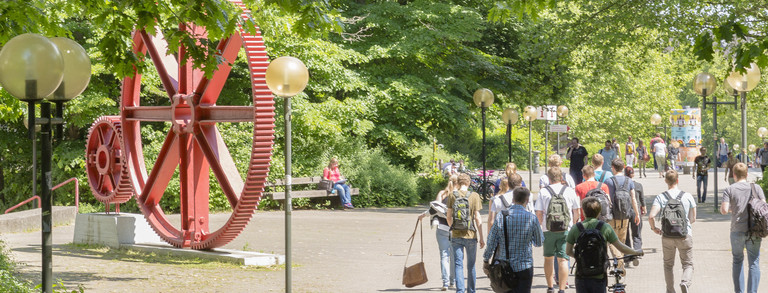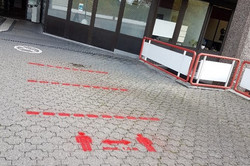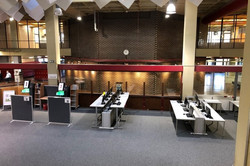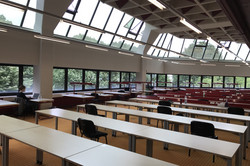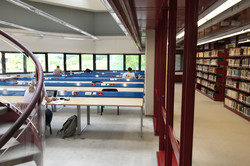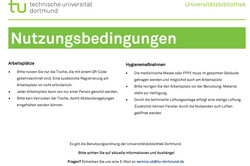Instead of an annual report: Dortmund UB in the pandemic year
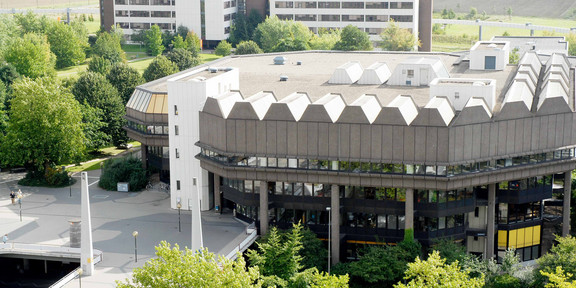
2020: The year of the virus
The Corona virus, which has been posing tremendous challenges to the entire world for more than a year, hit us with full force in March 2020. Normal university operations were suspended and the university library also had to close as of March 16. All employees of TU Dortmund University had to get used to working from their home offices, and students had to get used to digital teaching at the start of the summer semester in April. This initially unfamiliar way of studying, learning and working was to accompany us for much longer than was initially imaginable.
However, the UB immediately began to optimize the supply of literature with digital media and to provide printed media in improvised ways. As soon as it was legally possible and justifiable, learning workstations and services were also offered again on site, and the changed conditions of the pandemic were always responded to flexibly and as quickly as possible. The safety of all and the best possible support for research and teaching were guiding principles. Without question, this was a feat of strength that would not have been possible without the commitment and high motivation of the library's employees.
The next step in digitization
The university library was already well prepared for the unexpected lockdown with its digital services, which had been continuously expanded over the years. Even before the pandemic, the UB had spent about 85% of its budget on electronic media, whose usage figures are among the highest in the country. It was also helpful that the UB had expanded its metadata management in recent years and, unlike many other libraries, was able to ensure that the large number of new electronic media was almost completely searchable and retrievable in the catalog. The UB was able to cushion the overload of VPN access because it had already introduced other authentication methods such as Shibboleth (logging in with the university account) to the maximum extent before the pandemic.
The range of e-books [1] could already be significantly expanded in the summer semester 2020 thanks to special Corona funds from the TU Dortmund University. This was supported by additional offers from many publishers who provided temporary electronic access, a total of over 600,000 titles. Some accesses are even available until 2021 or beyond. Thus, the supply of literature at TU remained essentially uninterrupted and was in high demand. Unfortunately, due to a change in counting procedures, the official figures for e-book access do not reflect the actual increase in usage.
| 2020 | 2019 | |
| E-Books | 254.000 | 179.328 |
| E-Journals | 68.220 | 50.058 |
| Accesses to e-books | 7.751.720 | 8.220.795 |
| Loans printed stock | 442.012 | 570.699 |
Flexible solutions: Delivery services in the pandemic
One of many examples of small, unbureaucratic solutions was a special delivery service for scientists: anyone who urgently needed literature, e.g., for their own notebooks, could have it sent to their home address before the start of the semester. The service was particularly flexible: While the UB was completely closed for four weeks during the first lockdown, the first issue of urgently needed media for students and scientific employees of the TU Dortmund was organized very soon. The books, which had been ordered in advance by e-mail, could be picked up contactlessly in the parking lot in front of the UB's staff entrance. In the press, our offer was compared with the drive-in offers of fast food chains.
After the Central Library was allowed to reopen on April 20 exclusively for borrowing and returning media, a delivery service was set up for the three area libraries that remained closed. The desired media could be ordered directly via Katalog plus and picked up and borrowed one day later in the central library using contactless technology. From the beginning, this option was much used and presented the UB with the organizational challenge of managing the delivery within one day with the few staff who were allowed to be on site at all.
Learning in the library
The TU Dortmund University was forced by the pandemic to switch from face-to-face teaching to digital seminars and lectures. Nevertheless, it soon became apparent that many students still wanted to learn on campus and there, above all, in the library. The nearly 1,300 workstations in the central library, which have been highly frequented for many years, continued to be more than in demand even in times of pandemic.
In mid-June, the much sought-after study spaces were also reopened under strict hygiene regulations. After starting with 25 seats on the first floor, it quickly became clear that it was not enough. In numerous comments on the UB blog and in e-mails to the library, students wished for rapid expansion (one example: "Providing 25 places with approx. 34,000 students is unfortunately a bad joke. Is there maybe a waiting list where I can enroll in the thousandth place and then wait months for a seat. (Caution: sarcasm)".
Just two weeks later, the UB was able to remedy the greatest need and provide another 50 seats on the first floor. Since safety was an absolute priority, the hygiene concept was carefully coordinated within TU. The UB pioneered registration via the TU app, and the system for logging in and out was then implemented by the IT & Media Center for the entire TU. The opening hours, which were extended at the same time at the end of June, remained unchanged for the next four months, but in September, due to the urgent request of users, the space booking was adjusted so that spaces could now also be booked for half days. At the end of October, the opening hours per day and per week were considerably extended and many more learning places were added - also on the 2nd and 3rd floors. After more than half a year of closure, the Emil Figge Library was also finally able to reopen. Shortly before Christmas, with the next lockdown, many relaxations had to be taken back again and the TU Dortmund went on early vacation.
Projects during the pandemic
During the Corona-related restrictions, TU Dortmund employees were required to do everything that did not necessarily have to be done on campus in their home offices. Seeing colleagues only in small tiles during video conferences and discussing everything necessary with them in this way soon became a well-practiced routine. Despite, or perhaps because of, working at home and communicating almost exclusively by phone and videoconference, the UB managed not only to keep major projects going, but also to move them forward: In May 2021, it was among the six university libraries that were the first to introduce the new, NRW-wide library management system. With this cloud-based system, there is great potential for the UB to offer its services efficiently and in line with demand in the future. In 2020, extensive work was already necessary to prepare everything technically and organizationally for the changeover.
Many consulting and support services were quickly offered in digital form. Courses and office hours at the UB, e.g. on the literature management program Citavi, or the Coffee Lectures on scientific work, also took place in digital format. Construction planning for the library's new central building continued via video conference.
The RFID project, in which all of the library's media holdings are being
[1] Unsere E-Books nach Verlagen







